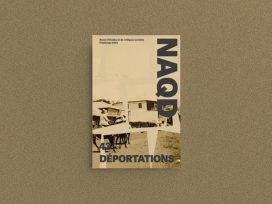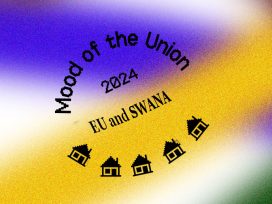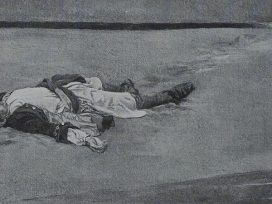Exile in literature is not only a story but also a structure. When France occupied Algeria in the nineteenth century (1830-1857) and turned it into a colony, the Algerian people were, in a sense, expelled from their own country. If one bears in mind that the acquisition of property is the main purpose of any colonization, it could be said that Algerians were evicted from their own country while remaining within it. This unique and violent situation lasted until Algeria gained independence in 1962.
Algerians were considered by the French to be less intelligent and less civilized than themselves. They were placed on the “wrong” side of the dualities “sound versus meaning”, “body versus mind”. Teaching Arabic and Berber was in effect forbidden. Consequently, Algerians had to learn to deal with and to understand the colonizers. It was a sure way not to feel “at home”, to lose both confidence and hope. To be excluded from the centre, to become decentred, are the main characteristics of the subjective experience of colonization. To break the colonial chains in the struggle for independence is different from decolonization. Independence is not the end but the beginning of the decolonization process. Independence is not the end of being decentred.
After independence, the linguistic situation did not improve (despite political independence and better social conditions). French is not a global language like English; it is not a way to communicate regardless of location. French was a colonial language and is now a local language. After independence, the Algerian government chose Arabic as Algeria’s official language. Strangely, however, Arabic is not an Algerian but a Middle-Eastern language. Unlike Arabic, the autochthonous Algerian language – Berber (whose variations include Kabyle or Tamazigh) – is unwritten. The French government, on the other hand, chose to continue its francophone policy in the former French colonies in Africa (North Africa included). Upon independence, then, Algeria was born with two foreign languages: Arabic and French.
Algerians, including writers, were in exile in Algeria before independence. That is why exile should be regarded as a movement rather than a location. But what kind of movement? With Algeria, it was double: in the mind and in language. This movement is unheimlich: strange but uncannily familiar. The novelist Assia Djebar is a case in point. Like the father of novelist and playwright Kateb Yacine, her father belonged to dual cultures: Muslim and Arabic mixed with French and European. Both writers published their first book in the 1950s: Nedjma (Kateb) in 1956 and Thirst (Djebar) one year later.
Assia Djebar was born Fatma Zohra Imalhayène in june 1936 in Cherchell. She spent her childhood in Mouzaia, where her father was a teacher. She attended school at Blida’s college in Algeria (1946-1953); here there were approximately 20 French Muslims studying modern literature (before the Second World War war, Algerians were classified as “indigenous”; afterwards they were called “French Muslims”). At Blida’s college, Djebar discovered literature in languages with phone (Arabic and French) and without phone (Greek and Latin). Around the time of the publication of Thirst, Djebar was admitted into the Ecole Normale Supérieure in Paris; she was, however, expelled before she could finish her studies.
Language played a crucial political role in post-colonial Algeria. Kateb Yacine called the French language “the spoils of war” (“La langue française reste un butin de guerre.”) and considered the best way to write was to continue to use it. His idea was to adopt French as a free choice; however Kateb felt guilty about speaking and writing in French and decided to use Algerian Arabic in his plays. Can the subaltern speak? The subaltern has already demonstrated his ability to speak: to elaborate an intellectual or literary discourse. Can the subaltern write? The subaltern must now find a way to make French his own language. That is why I prefer to talk about Djebar’s “francographie” instead of her “francophonie”. It is no longer the time for Algerian authors to demonstrate their ability to speak French, but to write it too. Djebar distinguishes between “texte francophone” and “écrit français“. Her distinction is based on gender (masculine or feminine); belonging (land or territory); parentage (their memory, their history, their authority); and language (first or second language, written or spoken).
Djebar’s books incarnate the effort to decolonize her language in a postcolonial environment. Is she an “Algerian author”? She has been a member of the French Academy for two years and is the first female member to come from a former-French colony. Djebar lives in three places, the third of which is New York. It is impossible for her to work in Algeria, because she has no freedom there; the recent civil war is a further reason for her to stay away. She cannot work in France because, like many others from the “South”, she has no place there. Exile can be a third space. Djebar says she is inside and outside at once. For her, exile is a tragedy but also an opportunity to be able to think inside (hic et nunc) from outside (anywhere).
In her world, Djebar is concerned with three countries (Algeria, France, the United States) and three languages (Berber, Arabic and French). Language is the main character in Djebar’s books (the second is death). Her language is Arabophonic (with sounds and accents) in a French hybrid (and style). She transforms writing into talking. It is her way to cut the “umbilical cord” (Kateb Yacine) to her country of origin, to her land. Yet she was already in exile when she lived in Algeria; literature is always exile. Writing goes beyond childhood and lost time; it is a universal situation. But it does not always have the same meaning, with the same things at stake, for all writers. It depends on one having place(s) in one’s own land or country (of origin), in one’s own (or first) language. The subaltern has no place in Algeria’s colonial organization, yet Djebar is not looking for a place to write. If we are to admit that the mother tongue is “the” place, then the post-colonial writer is definitely not there.
On the other hand, choosing French and living abroad creates a great sense of debt in Assia Djebar’s writing. Because of this, she devotes her energy to building “tombs” (tombeaux) to Jean Senac, Malek Haddad, and many other Algerian and intellectual friends. She also writes to build an Algerian and literary genealogy. To be in exile is to surrender one’s past; exile is something like mourning. In Aranda (the language spoken by Australian Aborigines), the poetic and archaic term eraritjaritjaka means, as Elias Canetti pointed out, to be “moved by something lost”. When Heiner Goebbels conceived the play Eraritjaritjaka (2004), based on texts by Canetti, he imagined two houses on stage. One was very little, like a doll’s house. The other was a place to live, to read, to write. Home is the best metaphor to express what literature (and art) do. According to this point of view, literature is not a monument, but a house, a place not to feel good, but simply to exist. Rainer Werner Fassbinder said that each of his films was a way to build a house and to be at home. Assia Djebar’s literary exile is something between home and the grave.
What cannot be said must be kept silent (Wittgenstein). Or perhaps: what cannot be said must be written. In Assia Djebar’s work, French is not official and formal “armour”. Nor it is a “veil”. Rather it is a “second skin”. French is “white”, a colour where all other colours can be painted and written. Skin envelops the body and is the limit between inside and outside. Moving inside from outside and outside from inside is what Djebar does when she writes. She related a particular linguistic experience in Le Blanc de l’Algérie, a book written in memory of three Algerian intellectuals murdered in 1993 during the civil war (Mahfoud Boucebci, a sociologist; M’hamed Boukhobza, a psychiatrist; and Abdelkader Alloula, a playwright). She told of her relationship with her friends, mentioning that, in their conversations, French was the appropriate and neutral language between a man and a woman.
When Djebar was elected to be a member of the French Academy – to join the French “immortals” – she said (quoting Diderot and his Letter on the deaf and dumb) that she would like to be inside and outside at the same time. How does she attempt this? She transforms written French into a foreign written language from the French point of view. She gives another land, her own Mediterranean and postcolonial land, to written French. She Arabizes French with Arabic sounds and Algerian accents. She invents a territory: “Writing and Algeria as territories” (“L’écriture et l’Algérie comme territories“). She says that literature is a desert (“Le désert de l’écriture“): a land without people and cities, where the writer is alone, a desert that is to be crossed silently. It is a typically Mediterranean – Christian and Muslim – metaphor. At the (happy) end, there is always an oasis.
In this context, French can disappear – as in the novel entitled The disappearance of French (La disparition de la langue française). The novel’s protagonist is Berkane, a migrant who returns to his country of birth (perhaps his parent’s country). Living in Algeria, he rediscovers places with words (words with places) and words as places. Once again, he’s a young boy in the casbah: ould el houma, l’enfant du quartier, a street kid. When he hears Arabic, he returns to Algiers, Djazirat el Bahdja, the beautiful city, and he feels at home. The return to his native country is an appeal to bilingual French-Algerian shadows: Nil street, zenkette el Meztoul, rue du Drogué, drug addict street… here French becomes Arabophonic. While Leopold Sédar Senghor “Wolofizes” French and Ahmadou Kourouma“Malinkizes” it, Assia Djebar “Arabizes” the French language. In this operation, French disappears and post-colonial writers are born in exile.
All things considered, in literature, exile depends more on language than on location. That is why it is possible to compare Assia Djebar with Elias Canetti and Kateb Yacine, and Franz Kafka. Literature is not another language, another style: literature is the Other language. To a greater or a lesser extent, these writers have a voice, not just a style. The reader therefore faces a great challenge: to hear the author’s voice and accent. In Assia Djebar’s work, literature is both research (ijtihad) and healing (shefa’). Literature is a way to rediscover phone in language. An example of Djebar’s concern with the phonetic qualities of language: the title of her novel Les Alouettes naïves was prompted by an account of how French soldiers called young dancers from Ouled-Naïl, an Algerian region, “Alouettes naïves” (naive larks).
Canetti, Kateb, Kafka… Assia Djebar. She has transcended tradition. As a woman, it was difficult for her to gain acceptance in Algeria. Literature must not be confused with translation. In her literature, exile has a strong accent. Translation involves two written languages. But since there are no fixed forms of language, either written (French) or non-written (Algerian), it is impossible to move from one to the other, like in a translation. Here, writing is different. Moreover, Assia Djebar writes from a feminine linguistic universe. In Femmes d’Alger dans leur appartement (“Algerian women in their apartment”: the title is a reference to Eugène Delacroix’s great painting), Assia Djebar wrote that translation was impossible for her.
Djebar moves from official language to personal language, from French to Arabic, she crosses the North African border between man and woman, she goes from Africa to Europe, then from Europe to America. The post-colonial context is complex, complicated, and sometimes hostile. Movement is necessary in order to live, to think, or at the very least to write. Unlike in Proust, there is no nostalgia in this literature because the past has no magic charm. In a lecture on Albert Camus, Djebar noted that Camus didn’t have a mother tongue (“la non-langue maternelle de Camus“). Albert Camus never heard his mother speak: she was mute. At that time, Djebar felt nostalgic about her own mother tongue, which prevented her from writing: Assia Djebar’s mother spoke French with her neighbours without having learned to write it.
In this postcolonial context, exile is not an accident. Postcolonial literature shares features with European Jewish literature. Cosmopolitics is the other face of globalization; it does not necessarily entail the disappearance of identity. In this respect, it differs from “metissage” (the cultural mix). Cosmopolitical literature is a hybridization in which literature can develop other faces and new aspects. It is found in a “third space” – a literature that is neither from the country of the former colonial subject (Algeria) nor the country of the former colonizer (France); it is a literary language that is neither French nor Arabic. Therefore, the concept of movement allows one to define exile as literature, and literature as exile. The summary of L’Amour, la fantasia’s is a case in point. The title of the third part of this book is “Les voix ensevelies” (buried voices). It is divided into five “movements” – like piece of music. The following is taken from the first movement: “the two strangers”.
A l’aéroport, directement ! ai-je précisé.
Mon père, que j’ai si peu connu, était français ; Taos, dans son exil, l’est restée. J’ai eu l’heureuse idée d’inscrire Meriem, à sa naissance, sur mon passeport également français, que je croyais pourtant ne plus avoir à utiliser… Dans l’avion pour Marseille, après le décollage, je songe enfin à l’attente de Fatima, là-bas, à son inquiétude.
De Marseille, nous prenons le bateau pour Palma. Taos nous accueille toutes deux, le sourire dans les yeux, mais sans poser de question.
-Voyageuses sans bagages ! dis-je, mélancolique.
Now, the question is no longer whether the subaltern can speak, nor whether he can write. The real question now is: can the non-subaltern hear and read? Is he able to understand new voices, new sounds, new accents, from outside? Can France have a relationship with its ex-subaltern? When this happens, post-colonial countries will be decolonized. It will be the end of the postcolony.






